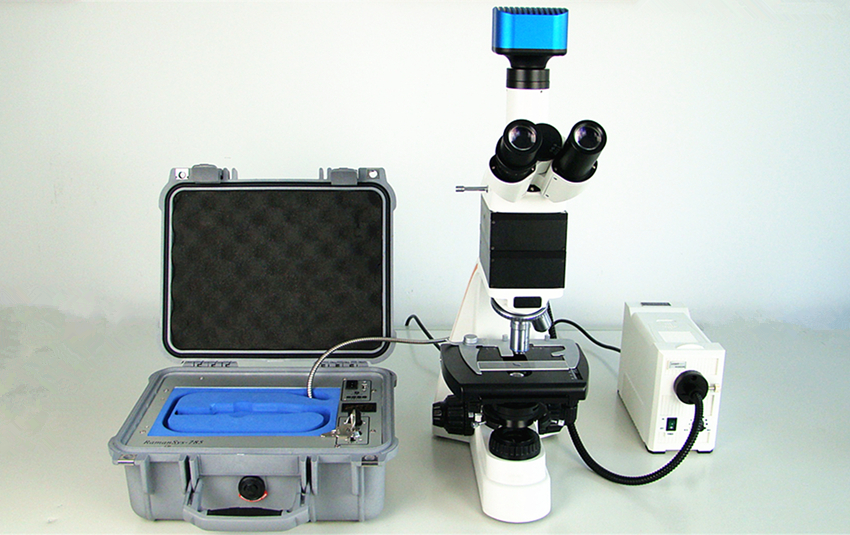Confocal Laser Scanning Microscopy (CLSM) consists of confocal
microscopy, laser and data acquisition system. It is a combination of the
optical microscope, the modern laser technology, Raman detection technology,
scanning control technology, computer image processing technique and
fluorescence labeling technique. Its application and research field include the
observation of life living cell structure and specific molecular, Ion
biological changes, pharmacology, genetics, spectroscopy and related subjects.
Specific applications such as: stochastic optical reconstruction microscopy(STORM), fluorescence lifetime-transient
scanning(FLITS), fluoresence recover after photobleaching(FRAP), stimulated emission
depletion(STED)etc.
Features
â– CNI self-developed high reliability lasers.
User requirements can be realized.
â– CNI can provide different lasers with free
space and Multi-wavelength single-mode fiber coupling, and related
Laser Related
Wavelengths: 266nm, 355 nm, 360 nm, 375 nm, 405 nm, 442 nm, 445 nm, 457 nm, 465 nm, 473 nm, 488 nm,
515 nm, 520 nm, 532 nm, 556 nm, 561 nm, 589 nm, 593 nm, 633 nm, 637 nm.640 nm, 671 nm.
690 nm, 720 nm, 750 nm, 785 nm, 808 nm, 1064 nm, 2200 nm etc. Single
longitudinal mode, narrow linewidth
Accessories
Application of CNI laser for Confocal Laser Scanning Microscopy from customers
(1) Antimicrobial Photodynamic Efficiency of Novel Cationic Porphyrins
towards Periodontal Gram-positive and Gram-negative Pathogenic
Bacteria
(2) Calcium Dynamics in Root Cells of Arabidopsis thaliana Visualized with
Selective Plane Illumination Microscopy (PloS one, 2013, 8(10):
e75646.) (CNI-442nm)
(Applied Optics, Vol. 53,
Issue 31, pp. 7177-7181 (2014)) (CNI-532nm)
Laser For Confocal Scanning Microscopy Laser for Confocal Scanning Microscopy,Green Laser for Microscopy,Laser Microscope,Laser Scanning Microscope Changchun New Industries Optoelectronics Technology Co., Ltd. , https://www.lasersciences.com
â– System is stable and reliable. Customized solution can be
provided upon request.

(Photochemistry and
Photobiology, Volume 90, Issue 3, pages 628–640, May/June 2014) (CNI-635nm)
(3) Fluoxetine induces vasodilatation of cerebral arterioles by
co-modulating NO/muscarinic signalling (Journal of Cellular and
Molecular Medicine, Volume 16, Issue 11, pages 2736–2744, November 2012) (CNI-532nm)
(4) Fluorescence ghost imaging with pseudothermal light (Optics Letters, Vol.
36, Issue 16, pp. 3302-3304 (2011)) (CNI-473nm)
(5) Improved Temporal Resolution and Linked Hidden Markov Modeling for
Switchable Single-Molecule FRE (ChemPhysChem, Volume
12, Issue 3, pages 571–579,February 25, 2011) (CNI-532nm)
(6) Near-field Raman imaging using optically trapped dielectric microsphere (Optics Express, Vol.
16, Issue 11, pp. 7976-7984 (2008)) (CNI-532nm)
(7) Ultra-high resolution Raman imaging by optically trapped dielectric
microsphere (NanoScience+
Engineering. International Society for Optics and Photonics, 2008:
70330E-70330E-7) (CNI-532nm)
(8) Luminescence enhancement in nanocomposite consisting of polyvinyl
alcohol incorporated gold nanoparticles and Nile blue 690 perchlorate
Changes in global LED bulb prices in December 2016
The research institute surveyed the price of LED bulbs (hereinafter referred to as 40W or 60W LED bulbs) of 40W grades and 60W grade incandescent lamps sold by major brands in major global markets to understand the global LED bulb price trends. It is reported that the data is based on the weight of the sales volume, the average price of the LED bulbs is calculated, and the price trend is reviewed every two months. In the Asian region, the average price of 40W and 60W LED bulbs in the Japanese market in December 2016 was 1,390 yen (about 12 US dollars) and 1,902 yen (about 16.7 US dollars), up 1.6% from October 2016. The decline was 0.5%, the former with Mitsubishi Electric's double monthly increase of 15.9%. The average price of the 40W and 60W grades in the Korean market is 7,957 won (about 6.4 US dollars) and 12,238 won (about 9.8 US dollars). The two are up 0.8% and down 2.7% from October 2016. The former is LG. The two-month increase was 5.6%. The average price of 7W and 9W for the general brands in the mainland was RMB 26.3 (about US$3.8) and RMB30.4, respectively, which was 5.4% lower than October 2016 and up 0.3%. In addition, the highest prices of mainland first-line brands 7W and 9W are Tsinghua Tongfang and Foshan Lighting, respectively, at RMB 31.5 and RMB 29.9. In the European and American markets, the average price of 40W and 60W LED bulbs in the US in December 2016 was 15.9 and 20.5 USD respectively, down 7.6% and 2.4% respectively from October of the same year. The former fell by 12.8% in Cree's two months, the latter. In Philips, the monthly decline was 11.6%; the average price of 40W and 60W LED bulbs in Europe was 7.0 euros (about 7.3 US dollars) and 9.4 euros (about 9.9 US dollars), up 4.5% and 19% respectively compared with October. The former rose by 37.1% to LG, while the latter rose by 47.3%. In December 2016, the highest price per unit price for the 40W and 60W grades was Philips and OSRAM in the Korean market, which were 133.3 lm/dollar and 262.1 lm/dollar respectively. In addition, the average luminous efficiency of 40W and 60W grades was the highest. Toshiba in the Japanese market is 84.2 lm/W and 107.8 lm/W, respectively. In December 2016, the average price of 40W and 60W LED bulbs in the US was 15.9 and 20.5 USD respectively, down 7.6% and 2.4% respectively from October. The spread between the two was enlarged to US$4.6.